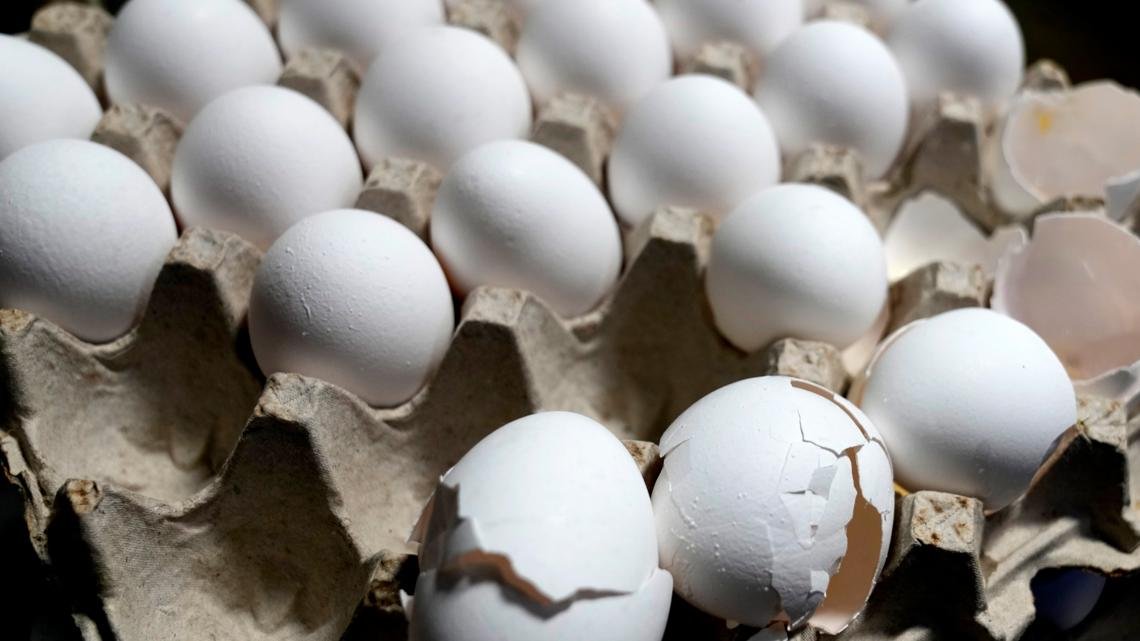Business
Egg Prices Soar to Unprecedented Highs, Defying Trump’s Predictions Amidst Bird Flu Slowdown

WASHINGTON — U.S. egg prices surged in March, reaching a staggering $6.23 per dozen, defying earlier expectations of a decrease. Despite falling wholesale prices and no bird flu outbreaks reported among egg farms, consumers and businesses are unlikely to see any immediate relief.
The Consumer Price Index released Thursday confirmed the ongoing inflationary pressure on egg prices. Demand for eggs typically rises before Easter, which is slated for April 20 this year. Experts had anticipated that the decline in wholesale prices observed in March would lead to lower retail costs; however, the timing of these changes may not have allowed for any noticeable effect yet.
Jada Thompson, an agricultural economist from the University of Arkansas, noted that the wholesale price drop only began mid-March, leaving insufficient time for retailers to adjust their prices downward. Grocery stores may have delayed reflecting these wholesale changes in their pricing.
Previous bird flu outbreaks led to significant price spikes, especially in January and February when over 30 million egg-laying chickens were culled to combat the virus. Fortunately, only 2.1 million birds were slaughtered in March, none from egg-producing farms. Producers affected by earlier outbreaks are gradually resuming production, but it takes about six months for newly raised flocks to begin laying eggs.
Despite Trump’s assertion that lower wholesale prices indicate success, experts argue that any real impact from his administration’s efforts to bolster defenses against bird flu will take longer to manifest. Thompson emphasized a unified desire among consumers for falling egg prices, highlighting the concerns surrounding agricultural inflation.
In a related note, Trump announced that the annual White House Easter Egg Roll will still feature real eggs, as egg farmers have traditionally donated over 30,000 eggs for the event. Meanwhile, some consumers are opting for plastic eggs to avoid current price hikes.
According to market research firm Datasembly, U.S. egg prices did show some decline beginning mid-March. The average price dropped from $5.98 per dozen in mid-March to $5.51 by the end of the month. However, prices differ significantly based on geographic location, impacted by local bird flu incidents and state mandates for cage-free eggs.
For instance, cage-free eggs at a Safeway in San Francisco hit $9.99 per dozen, while the same product was priced at $6.69 in Denver and $5.29 in Washington, D.C. In Omaha, a Walmart offered eggs for $4.97 per dozen.
Cal-Maine Foods, responsible for 20% of the nation’s egg supply, faces scrutiny as it is under investigation by the U.S. Department of Justice for rising egg prices. The company is reportedly cooperating with this inquiry. During the last quarter, Cal-Maine’s net income soared to $508.5 million, with revenue nearing $1.42 billion, largely due to high egg prices.
As the bird flu outbreak persists, over 168 million birds have been culled, predominantly affecting egg-laying hens. The disease, easily spread through wild birds’ droppings, complicates control efforts and threatens the broader poultry sector.
Egg prices soared to $5.90 in February, after a record $4.95 in January, significantly impacting consumers. In California, reports indicated some stores had egg prices exceeding $12 per dozen. Initially, prices fell as low as $2.04 per dozen in August 2023 but have resumed an upward trend.


















